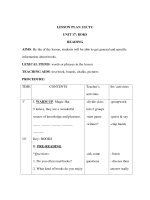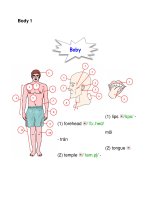Commas unit 17
Bạn đang xem bản rút gọn của tài liệu. Xem và tải ngay bản đầy đủ của tài liệu tại đây (323.51 KB, 11 trang )
Troublesome Pronouns
(Concluded)
Unit 17
Unit 17 Troublesome Pronouns
(Concluded)
Generic Pronouns
Singular Personal Pronouns
Personal Pronouns Before Verbs Ending in
- ing
Relative Pronouns Who and Whom
Unit 17 Troublesome Pronouns (Conclu
ded)
2 of 11
Generic Pronouns
In order not to discriminate when referring to groups,
avoid limiting the pronoun to any one gender. You do
this by altering the sentence or by using both the
masculine and feminine pronouns (he or she, him or
her).
Each person waiting in line had a number assigned
to him or her.
All students opened their booklets as the test
began.
Unit 17 Troublesome Pronouns (Conclu
ded)
3 of 11
Tryout Sentences
1.
2.
3.
4.
5.
Every agent must send (his, his or her) monthly tally
sheet to the main office.
Each member of the organization paid (his, his or
her) dues on time.
If wronged, any citizen can take (his, his or her)
case to the courts.
The average person will have no problem when (he,
he or she) goes to the polls.
When a taxpayer has a question, (he, he or she) may
call the IRS.
Unit 17 Troublesome Pronouns (Conclu
ded)
4 of 11
Singular Personal Pronouns
These words are followed by singular pronouns:
another
every
no one
anybody
everybody
nothing
anyone
everyone
one
anything
everything
somebody
each
neither
someone
either
nobody
something
Unit 17 Troublesome Pronouns (Conclu
ded)
5 of 11
Singular Personal Pronouns (cont)
Anyone, everyone, and someone are spelled as two
words when followed by a phrase beginning with of.
Every soldier is ready to defend his or her country.
Every woman in the military is ready to defend her
country.
Ask any one of the men for his opinion.
Unit 17 Troublesome Pronouns (Conclu
ded)
6 of 11
Tryout Sentences
1.
2.
3.
4.
5.
Each senator will visit (his or her, their) constituents
during the recess.
(Everyone, Every one) of the employees indicated
(his or her, their) agreement to participate in the
plan.
Please ask (anyone, any one) of the ushers to guide
you with (his or her, their) flashlight.
No one in my family returned (his or her, their) gifts
after Christmas.
I am sure that any one of the guests knows (his or
her, their) way here.
Unit 17 Troublesome Pronouns (Conclu
ded)
7 of 11
Personal Pronouns before Verbs
Ending in - ing
Personal pronouns that precede verbs ending in -ing
are expressed in the possessive form: my, your, his,
her, its, our, and their.
Your arriving late every day is cause for dismissal.
The doctor warned Esteban about his smoking.
Unit 17 Troublesome Pronouns (Conclu
ded)
8 of 11
Tryout Sentences
1.
The coach forbade (us, our) eating before the game.
2.
(Me, My) going depends solely on the weather.
3.
4.
5.
I am annoyed about (you, your) gossiping behind
my back.
The instructor would accept no excuse for (their,
them) missing the test.
Geraldo’s supervisor objected to (his, him) being
absent so often.
Unit 17 Troublesome Pronouns (Conclu
ded)
9 of 11
Relative Pronouns Who and Whom
Who and whom are relative pronouns that may be either
singular or plural in meaning. When deciding between
who and whom, mentally turn the sentence around and
substitute a personal pronoun for who and whom.
Who is at the door?
(I am at the door.)
Whom did Augusta appoint for the job?
(She appointed him for the job.)
Unit 17 Troublesome Pronouns (Conclu
ded)
10 of 11
Tryout Sentences
1.
2.
3.
4.
5.
Tell me to (who, whom) the package is to be sent.
After careful study the detective has discovered
(who, whom) is guilty of the crime.
(Who, Whom) is the person in charge?
List the names of four people (who, whom) I should
contact for interviews.
The clerk cannot tell me (who, whom) is to receive
the package.
Unit 17 Troublesome Pronouns (Conclu
ded)
11 of 11









